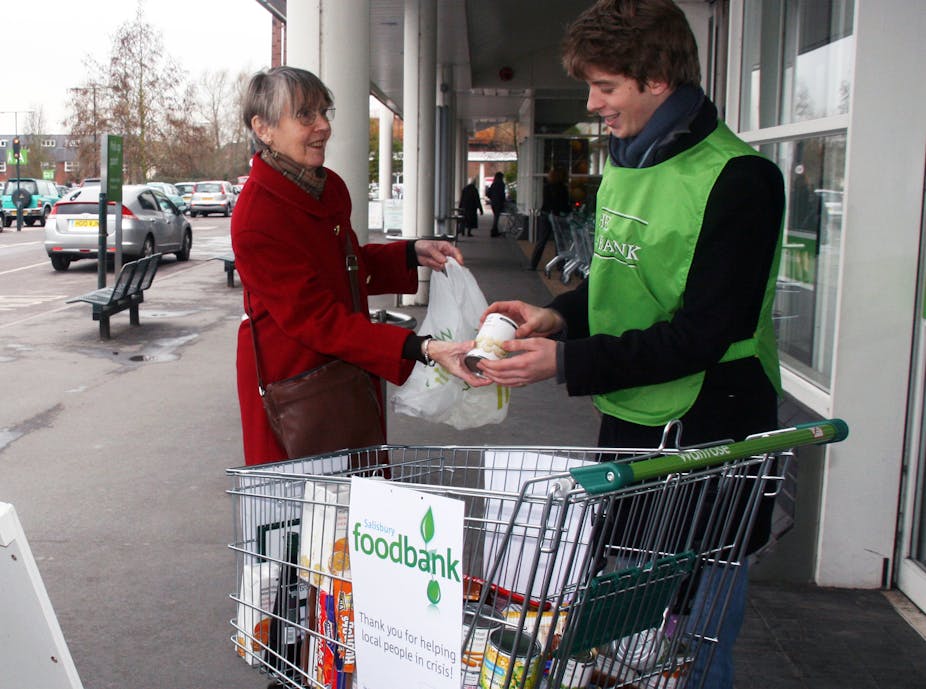Two reports published this week should act as a wake-up call to the government and society at large, as welfare reforms drive millions of the most vulnerable in the UK into destitution.
Oxfam’s “Below the Breadline”, compiled in conjunction with Church Action on Poverty and the Trussell Trust, revealed a 54% rise in the number of food parcels distributed in Britain over the past 12 months.
Food banks gave out more than 20m meals last year to more than a million recipients. Government welfare policy, in particular the use of sanctions withdrawing benefit and leaving those affected with zero income, is identified as the most important driver of this increase.
On the same day the Social Mobility and Child Poverty Commission reported that 3.5m children would be in poverty by 2020 without strong measures aimed at low-income households. It forecast that the UK government will fail in its legal duty to reduce child poverty by 2020.
Punishing the poor
These reports tell an all-too-familiar tale about the impact of government policy on the poorest in society. It is one in which the poorest and the most vulnerable are penalised for their poverty.
For half a century, household expenditure on food was falling as a proportion of total household expenditure. But now food prices are rising faster than incomes and this is set to continue. Yet Oxfam reminds us that this is not because the UK is getting poorer. In a country where the richest 1% own 54% of the wealth, the richest 1,000 individuals saw their income double over the past five years.
Inequalities are at the heart of understanding the welfare crisis. Thomas Piketty’s Capital in the 21st Century has shone the spotlight on wealth inequalities in the developed world while Wilkinson & Pickett’s The Spirit Level has linked them with a wide range of health inequalities. Both suggest far greater action is required by government if these widening inequalities are to be reversed.
The Scottish dimension
Scotland is one of the richest parts of the UK, yet it is also one of the most unequal and contains some of the worst areas of poverty. The Institute of Fiscal Studies estimated that child poverty rates will be back to the worst levels of one in three children living in households below the poverty line by 2020 if income redistribution is not accelerated.
Scotland’s health inequalities are also among the worst in the UK, which is linked to food poverty and food-related ill-health. The Scottish government’s Equally Well policy recognised that “Scotland’s health is improving rapidly but it is not improving fast enough for the poorest sections of our society.”

An example of this problem is that the richest 10% of the population has a life expectancy at birth of over 13 years more than the poorest 10%. Whether we are looking at cancer, heart disease or strokes, Scotland’s population suffers from high levels of mortality and high levels of health inequalities.
How we respond
The Scotland government has made some attempts to address these problems. It was the first part of the UK to ban smoking in public places, for example. It recently announced a £1m provision to emergency food suppliers over the next two years. It also piloted universal free-school meals, albeit this was short-lived and needs to be reintroduced. Universal free school meals policy is currently being rolled out elsewhere the UK for infants.
In any case, this week’s reports suggest these efforts represent far too limited a response in the face of the scale of the problem. Oxfam’s demands include: action against zero-hours contracts, limiting the use of welfare sanctions by the Department for Work & Pensions and increasing the national minimum wage to the living wage by 2020.
Certainly when Oxfam calls for government action to ensure that no one who is eligible for social security is left without money then it is a pretty good indication that something is wrong.
But while its proposals are a start, more far-reaching action to address income and wealth inequalities will still be necessary. Explicitly we need to think about much more progressive income tax policies, at least returning to the 50% top rate of tax; and we need to get serious about taxing not just income but wealth too. Irrespective of the referendum outcome in Scotland, only by making these kinds of changes will blights like food poverty and health inequality ever be addressed.

